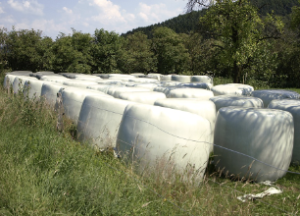In the agricultural realm, where every step holds significance in the cycle of harvest, preservation stands as a pivotal process. Among the array of tools aiding farmers in this endeavour, the silage wrap manufacturer occupies a crucial position. These manufacturers are instrumental in providing farmers with the means to efficiently store and safeguard their silage, an essential component in livestock feeding. This article explores the significance of silage wrap, the intricacies of its manufacturing process, and the innovations driving this industry forward.
Understanding Silage Wrap:
 Silage wrap serves as a specialized plastic film designed to envelop and seal silage piles or bales, effectively creating an anaerobic environment conducive to preserving the nutritional integrity of stored forage. Silage, a fermented feed derived from green forage crops like grass, maize, or legumes, undergoes a meticulous harvesting and compacting process before being stored in airtight structures. Silage wrap plays a pivotal role by thwarting oxygen infiltration, which could otherwise result in spoilage and nutrient loss.
Silage wrap serves as a specialized plastic film designed to envelop and seal silage piles or bales, effectively creating an anaerobic environment conducive to preserving the nutritional integrity of stored forage. Silage, a fermented feed derived from green forage crops like grass, maize, or legumes, undergoes a meticulous harvesting and compacting process before being stored in airtight structures. Silage wrap plays a pivotal role by thwarting oxygen infiltration, which could otherwise result in spoilage and nutrient loss.
The Manufacturing Process:
The creation of silage wrap involves a multi-step process, the first step of which is the extrusion of high-quality polyethylene resins into films that are both thin and durable. The trip starts with the selection of raw materials, which may include polyethylene pellets that are either virgin or recycled. After going through the process of melting and extruding through a die, these pellets are produced as a continuous plastic film. Immediately after this, the film is subjected to a process of stretching and chilling in order to acquire the necessary thickness and strength attributes.
Next, the film goes through a series of additional processing phases, which include embossing, printing, and sizing. In the process of wrapping silage bales, embossing gives the film a rough surface, which improves grip and makes it easier to exclude oxygen from the film. When printing, it is possible to include branding, guidelines for handling, and other information that is relevant to end-users. Finally, the film is wound into large rolls, which are then prepared for delivery to agricultural wholesalers and farmers.
Innovations Driving the Industry:
The landscape of silage wrap manufacturing is perpetually evolving, propelled by innovations aimed at augmenting product efficacy, sustainability, and user convenience. Notable advancements include the development of multi-layered films, incorporating specialized barrier materials to bolster oxygen exclusion and extend silage shelf life. These films may also integrate UV inhibitors to safeguard against degradation from sunlight exposure during storage.
Additionally, a silage wrap manufacturer prioritizes sustainability initiatives, such as utilizing recycled materials in film production and devising biodegradable alternatives to conventional plastic wraps. These endeavours not only mitigate the environmental footprint of silage storage but also align with broader sustainability objectives in agriculture.
Another realm of innovation lies in the fusion of technology with silage wrap products. Certain manufacturers offer films equipped with built-in indicators that undergo colour changes in response to temperature or pH fluctuations, furnishing farmers with invaluable insights into the condition of their stored silage. Furthermore, advancements in film adhesives and wrapping machinery have streamlined the application process, saving farmers both time and labour costs.
The Imperative of Quality Assurance:
For silage wrap manufacturers, ensuring product quality and consistency remains paramount. Quality assurance protocols may encompass meticulous testing of raw materials, in-process inspections, and comprehensive analysis of final products to verify performance metrics such as tensile strength, puncture resistance, and oxygen transmission rate.
Moreover, many manufacturers adhere to industry standards and certifications, including ISO 9001 for quality management systems and ASTM International specifications for agricultural films. Compliance with these standards not only assures farmers of product reliability and safety but also instils confidence in the performance of silage wrap solutions.
In conclusion, silage wrap manufacturers occupy a critical niche in the agricultural landscape, providing farmers with indispensable tools to safeguard their harvests and ensure the sustenance of livestock. Through continuous innovation and a steadfast commitment to quality, these manufacturers are instrumental in enhancing the efficiency, sustainability, and profitability of agricultural operations worldwide. As the demand for high-caliber silage storage solutions continues to escalate, a silage wrap manufacturer stands poised to remain an indispensable ally in the ongoing saga of agricultural progress.
